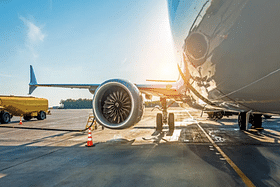In a first, the State-run oil Major, Indian Oil Corporation (IOC) has started the export of AVGAS 100 LL, a special aviation fuel meant for piston engine aircrafts and unmanned ariel vehicles (drones).
The first export parcel consisting of 16 kilo litres (KL) of AVGAS packed in 80 barrel was flagged off by IOC Chairman S M Vaidya to Papua New Guinea from GTI Terminal of JNPT on 28 January
This is the first-ever instance of India exporting this fuel marking its entry into an estimated USD 2.7-billion global market, the PSU oil marketing company (OMC) said in a statement.
AVGAS 100LL
Aviation gasoline, commonly known as “AVGAS”, and Aviation Turbine Fuel (ATF) are two different types of petroleum-based fuel used to power airplanes and other crafts.
Aviation Gasoline 100LL (AVGAS 100LL) is a lower lead version of Aviation Gasoline 100 (0.56g lead/litre Max). It powers unmanned aerial vehicles and piston-engine aircraft used by Flying Training Organisations (FTOs) and and defence forces for training pilots.
Until recently, AVGAS 100 LL fuel was imported at a huge cost from European countries for decades.
It was in September last year that IOC started producing AVGAS 100 LL at its Vadodara (Gujarat) refinery, which has an annual capacity of 5 thousand tonnes (TT) per annum.
AV GAS 100 LL has been tested and certified by Directorate General of Civil Aviation (DGCA). It is a higher-octane aviation fuel meeting the product specifications with superior performance quality standards, as compared to imported grades.
Export Rationale
By exporting the special fuel, the country’s largest auto fuel retailer aims to tap the $1.92 billion aviation gasoline market. AVGAS market is expected to grow from the current $1.92 billion to $2.71 billion by 2029.
“There is a significant consumption of AVGAS in South America, Asia Pacific, Middle East, Africa, and Europe. Therefore, there is a great opportunity to export AVGAS beyond the shores of India. As a first step in this direction, the first parcel of AVGAS produced in India was exported on date,” Vaidya pointed out.
Boost To Flight Training
The indigenous availability of AVGAS 100 LL will help in saving precious foreign exchange and also address the associated logistical challenges.
The move will also make pilot training in domestic flying institutes economical for budding pilots. There are over 35 flying schools in the country and the indigenous availability of product will benefit them.
The aviation traffic in India is likely to grow at 7 per cent CAGR (compounded annual growth rate), which would increase the requirement of trained pilots. As such, with the domestic availability of the special aviation fuel, the Ministry of Civil Aviation is considering opening more training institutes in the country.
The local alternative of AVGAS also has military implications as it can reduce the operating cost of UAVs that are increasingly being deployed by the defence forces as force multiplier.


